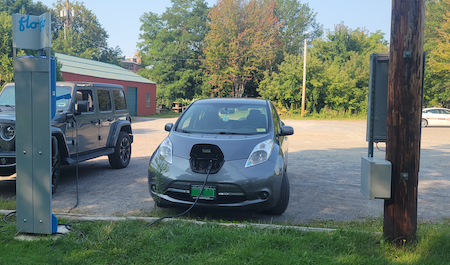By
Amanda Carlson, Special Projects Manager, Capstone Community Action
Three words/phrases have been weighing heavily on my mind the past couple years: transportation, equity, and global warming. My time at work is spent developing a new transportation service that directly grapples with the coexisting needs of reducing pollution from our cars and the greater transportation system, and the reality that living a high-quality life in Vermont requires a vehicle, or consistent access to one. I lived in the mountains of Colorado for some time after college and grew to rely on a comprehensive and free bus network that functioned very well due to a robust ski-town tax base, and settlement patterns that were confined by surrounding public lands.
When I moved back to Vermont, I had hoped to carry on with my car-light lifestyle, and then reality quickly set in that living in a rural area meant that I would be living an expensive, polluting, vehicle-centric lifestyle. In rural areas of Vermont, if you don’t have a car, your options are walking for miles alongside a road with no shoulder, biking, or relying on your neighbor/friend/family member for a ride. This reality is often coupled with the fact that the lowest-income Vermonters who do not have a car often have medical problems that require frequent doctors appointments, and make a long walk or bike ride impossible.
I work for Capstone Community Action – one of Vermont’s five Community Action agencies—an anti-poverty organization that serves Lamoille, Washington, and Orange Counties. Community Action agencies in Vermont have long provided low-income weatherization services that help make homes safer through improved ventilation and moisture control, and help homeowners stop heating the outdoors and save money through home insulation. Capstone added Climate Impact to the Weatherization department in recognition that people with the fewest financial resources will suffer the harshest consequences of global warming. So with this expanded vision, we looked to address another significant financial burden that families face: VT’s largest polluting sector, transportation—or lack thereof.
In the fall of 2020 Capstone launched MileageSmart—a used car incentive for highly efficient vehicles that compliments Vermont’s new plug-in and all-electric car incentive program. MileageSmart was born from an idea of former Senate Pro Tem Tim Ashe and climate justice conversations he had with Capstone’s Executive Director Sue Minter, and Capstone stepped up to design and administer the program. MileageSmart is predicated on a few realities: 1) if a low-income Vermonter gets into a vehicle, their prospects for socioeconomic improvement are significantly higher; 2) the vast majority of Vermonters use vehicles as their primary mode of getting around, and 3) the majority of low- and middle-income Vermonters purchase used vehicles. To date, MileageSmart has passed along incentives for approximately 375 vehicles, a mix of all electric, plug-in hybrids and conventional hybrids. The program requires a minimum of 40 combined MPG, which is significantly higher than the 23 MPG average for vehicles on Vermont roads. The MileageSmart incentive is passed along at the time of the sale, which we have heard from participants is extremely important, as it lowers the amount of cash a customer has to have at the time of a transaction. We are currently working to make some programmatic changes that will better target resources to those who need it the most.
To address the needs of Vermonters who cannot drive or don’t have reliable access to a vehicle, or families trying to get by with a single vehicle in a household, Capstone has been developing a new transportation service called Community Rides Vermont. This new non-profit will utilize a fleet of electric vehicles with paid drivers to provide subsidized and market-rate rides throughout Central Vermont. The priorities of this new service are:
- Provide rides to Vermonters that do not own or have consistent access to a vehicle (This includes rides to work, errands, childcare, medical appointments etc.)
- Allow flexibility in making multiple unplanned stops
- Provide rides during times of the day public transit isn’t available
- Provide rides for those living in rural and remote areas beyond the range of transit services
- Provide a viable option for two-car families to transition to one car
- Provide an on-demand ride-hailing service as soon as possible
The goal of our service is to be all electric at launch— both for the pollution reduction benefits, and as a means for low-income Vermonters to take part in the EV revolution. This service can demonstrate new technology that many Vermonters have questions about, and might want to check out before committing to purchasing an EV. We also view our service as an extension of public transit to rural areas, and will work to attract regular users, either as a means to get to their final destination, or as a connection to other transit.
Over the past couple of years, we have spent considerable time talking to stakeholders in the community, like partners in the human and healthcare fields, future potential users, local employers, and town committees to better understand what the community’s transportation needs are. It is our hope that, as a small business, we will be able to quickly adapt to patterns and trends to make service efficiencies, and offer a service that responds to community needs. If you live in Central VT, be on the lookout for Community Rides Vermont in early 2023!




